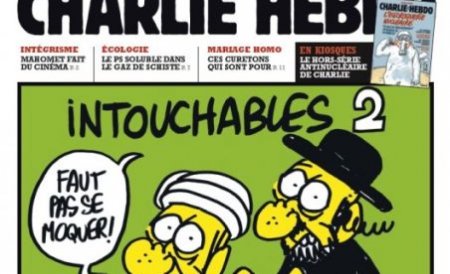
A legal complaint has been filed against French satirical magazine Charlie Hebdo, which published obscene cartoons of the Prophet Muhammad.
The complaint accuses the magazine of inciting hatred.
A little-known Syrian organization lodged the complaint with prosecutors in Paris, who will decide if action should be taken against Charlie Hebdo.
France is braced for protests, with plans to close some embassies in foreign capitals on Friday.
Embassies, consulates, cultural centres and schools in some 20 countries are to shut as a precaution. Public protests in Muslim countries sometimes take place after traditional Friday prayers.
A tenet of Islam bans the portrayal of its founder, the Prophet Muhammad.

Feelings in the Islamic world have already been running high over amateur video Innocence of Muslims mocking the Prophet Muhammad, which emerged in the US this month. Some 30 people have died in violent protests over the film.
Concern has been expressed by the White House over the decision to publish the cartoons.
The complaint against Charlie Hebdo was filed on Wednesday by an organization called the Syrian Freedom Association, which was registered earlier this year in France but appears to be little-known among Syrian expatriates.
It accuses Charlie Hebdo of “throwing oil on the fire by disseminating a cartoon against the Prophet Muhammad”.
While the complaint refers to “a” cartoon, there are several in the latest issue of the magazine.
Charlie Hebdo is accused of “publicly provoking discrimination, hatred or violence of an ethnic, racial or religious kind”.
Daniel Cohn-Bendit, leader of the main Green group in the European Parliament and a prominent figure in German and French politics for decades, dismissed Charlie Hebdo as “idiots” in an interview for French channel BFMTV on Thursday.
While such cartoons should not be banned, he said, there were “limits to provocation”.
“They are masochists, they must enjoy it,” he added
The French government met Muslim representatives in Paris on Wednesday as part of efforts to defuse anger over the cartoons.
Nerves were rattled after a lunchtime fire-bomb attack on a kosher grocery store in Sarcelles, a Paris suburb that is home to a large Jewish community, but prosecutors said it was too early to draw conclusions.
A French Jewish umbrella organization, the Crif, said in a statement it feared the attack, which left one person slightly hurt, was connected to the film protests.
One of the magazine’s cartoonists, Renald “Luz” Luzier, defended their publication.
They had not, he said, been aimed at provoking a violent reaction. He said the magazine had simply been doing what they usually do to cover news stories, on this occasion the uproar over the American film.
“I don’t think we decided to put oil on fire, we just did our work,” he said.
“Everybody’s looking or drawing flags like [it’s] a provocation but it’s not, it’s only drawings, it’s only a little sketch of papers, we are not in the Crusades.”
Luz said he had been under police protection since Charlie Hebdo’s Paris offices were burned down in a petrol bomb attack in November, following an edition in which the Prophet Muhammad was named as “guest editor”.
Some 20 cartoons feature in Wednesday’s Charlie Hebdo. They include graphic depictions of the Prophet Muhammad naked, with allusions to other current news stories such as the topless picture scandal involving the Duchess of Cambridge.